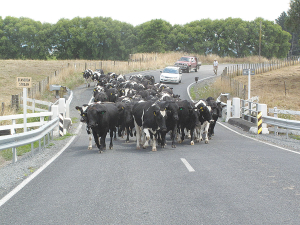Moving Day is a big day in the farming calendar and requires good planning and communication to ensure success.
For some, Moving Day not only involves shifting a household of belongings, but it also involves relocating farm equipment and animals. Early preparation is important, as is clear communication with your team, whether they are contractors, friends, or family, regarding your plans and expectations. Careful consideration must be given to animal movements, and all farm equipment and machinery should leave the farm in a clean and disinfected state to manage health and biosecurity risks.
Ensure sharemilker/contract milker contracts are signed by both parties and a farm inspection with new farm owner, incoming and outgoing sharemilkers, farm manager, farm advisor has been planned.
Determine your staffing needs for your new farm, start recruiting for required staff and ensure signed employment agreements are in place, alongside signed service tenancy agreements for any employees who will live on farm.
Ensure anyone coming onto the farm hasn't been overseas in the past seven days to reduce the risk of introducing exotic organisms, especially if they have been travelling to countries with foot and mouth disease (FMD) and have been in contact with FMD-susceptible animals (e.g. farmed or wild cattle, sheep, goats, pigs, deer, llamas, alpacas).
Communicate regularly with the people on your existing farm and the people who will be on your new farm about your plans - dates, key information etc. Ensure staff have enough time to be prepared, pack and clean in the weeks leading up to moving. If necessary, adjust rosters and hours of work.
Get in touch with your insurer well before the move - there might be more things to discuss than you think. It's a good idea to know the physical address, building details, any plant or machinery details, and the details of your sharemilking or contract milking agreement if applicable.
Contact your utility providers (e.g. power, internet, etc.) and ensure you will be disconnected and reconnected on the right dates. Take and record final power meter readings for all houses at both propeties.
Farm Owner
A farm owner is responsible for:
- Ensuring employees leave houses clean and tidy. Complete a house/s inspection for any maintenance required on current farm by end of April and arrange for any repairs and upgrades required. Check you comply with healthy home standards.
- Completing a final house inspection with existing tenant (sharemilker and/or employees) as soon as house/s are vacant.
- Consider whether drug testing of house/s will be required.
- Confirm with departing and new tenants their departure and arrival times so there is no cross over between parties.
- Check with your insurer what obligations you have in terms of inspections and what, if any, impact this could have on your insurance cover.
Sharemilker
Sharemilker and contract milkers are responsible for:
- Ensuring that their own house and their employees house/s have been left in a clean and tidy state to the standards agreed in the contract.
- Consider whether drug testing of house/s will be required. If yes, arrange contractors and discuss with farm owner.
- Completing house/s inspection with employees and then farm owner as soon as house/s are vacant, and complete house/s inspection prior to moving in on new farm.
- Immediately discuss any issues with farm owner, agree a plan and document this.
Contract Obligations
Ensure all body condition score (BCS), pasture cover targets or supplements on hand will be met as per the contract on takeover date. If they are not going to be met, have a proactive conversation with the other party as to what arrangement can be made to compensate:
- Obtain third-party advice if required to reach an agreement.
- Contract third-party to measure surplus/deficit feed inventory and quantify if required.
- Refer to your contract which should clearly show the exact amount of feed required on hand as well as the process to follow if the actual feed inventory is different to this.
- Ensure calves are fully weaned and are getting their daily requirements through grazing pasture prior to moving them off-farm.
- Winter and heifer grazing contracts should clearly set out the roles and responsibilities of the animal owner and the grazier, including weight targets, feed management, animal health and transport.
Understand new resource consent management requirements of new property (e.g. recording monthly water use, completing compliance forms for environment).


















